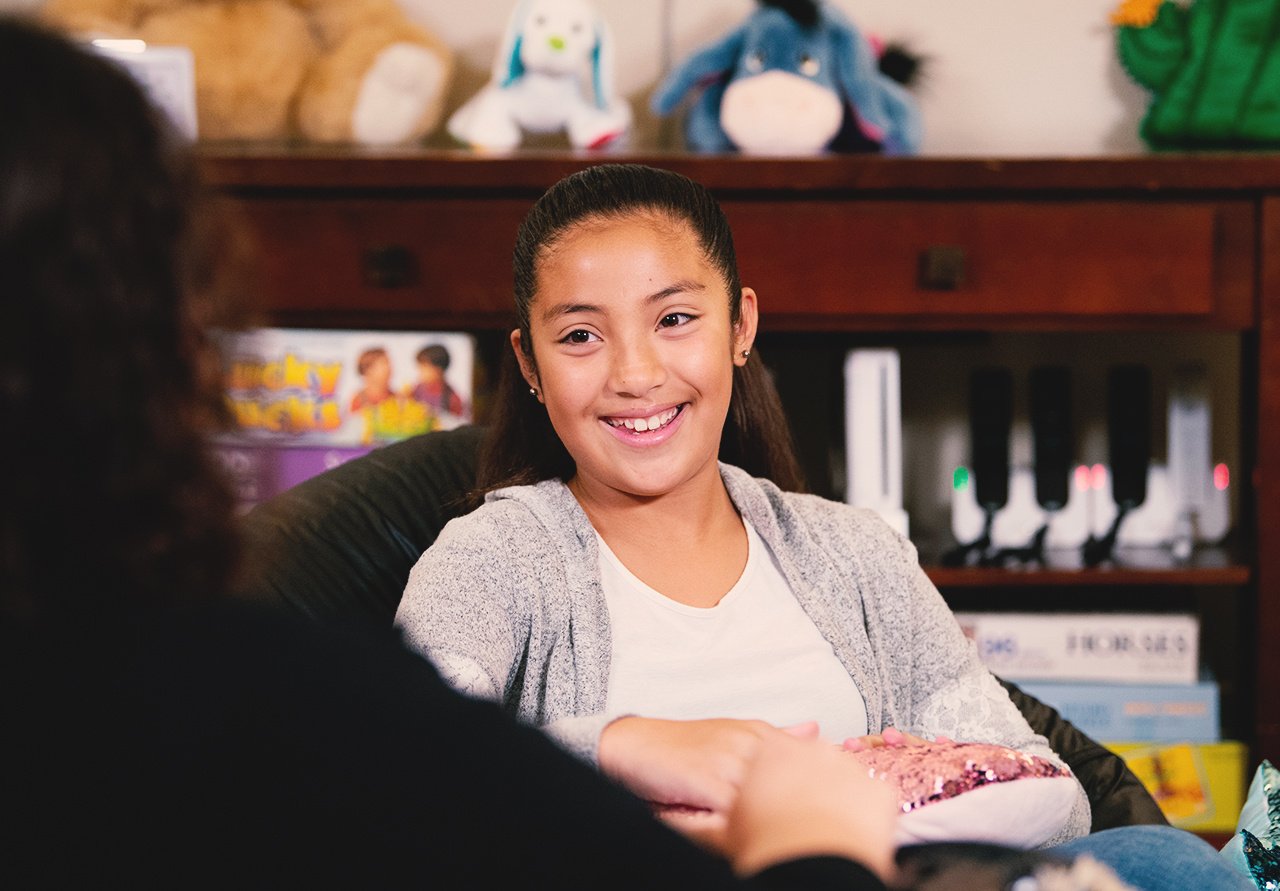
The teenage years are often described as a rollercoaster, and for good reason. This is a time of growth and change, as well as emotional ups and downs, and for many teens, it represents a time of significant mental health challenges.
Research shows nearly half of teenagers in the U.S. will experience a serious mental health issue at some point. For parents and caregivers, recognizing the signs early and understanding the benefits of therapy for teens is crucial.
Teen therapy can offer a safe space for youth to express their feelings, learn coping strategies, and build resilience. In this article, we’ll discuss how to spot mental health warning signs and how therapy for teens can help.
Signs Your Teen Might Need Therapy
Recognizing when your teen may need therapy isn’t easy, but it’s essential. Half of mental illnesses begin by the age of 14, making early intervention key. Studies show that early diagnosis and intervention improve both immediate and lifelong outcomes.
Changes in behavior might indicate that your teen is experiencing more challenges than usual. These red flags could indicate underlying mental health issues, so it’s important not to ignore them:
- Extreme mood swings
- Social withdrawal
- Sudden academic decline
- Loss of interest in activities
Additionally, certain life events can trigger the need for professional support. Experiences such as the loss of a loved one, trauma, or significant life transitions can be overwhelming for teens. Reaching out for therapy early can help minimize the impact, promote healing, and prevent mental health struggles from escalating.
If you notice signs of severe distress, it’s critical to address the risk of self-harm or suicidal thoughts as soon as possible. Read more about suicide prevention or how to help someone you love.
Common Issues Addressed in Therapy for Teens
Therapy for teens offers support for a range of challenges that can affect their emotional well-being and mental health. Whether it’s depression, anxiety, self-esteem, substance abuse, or other problems, counseling provides a safe space for teens to explore their feelings and develop coping skills.
Depression
Depression among teens is a growing concern, especially for young girls. It can arise from many sources, such as low self-esteem, complex family relationships, social struggles, or academic pressures. Depression can feel overwhelming and isolating, making it hard for teens to find their way out alone.
Therapy for depression helps teens understand their emotions, develop healthy coping strategies, and build strong support networks. Focusing on these areas can improve a teen’s mood and overall quality of life.
Anxiety
Teen anxiety can stem from a range of causes, including:
- Stressful home or school environments
- Bullying or social exclusion
- Past abuse or trauma
- Societal expectations and peer pressure
- Family conflicts or communication breakdowns
These stressors can create ongoing feelings of worry, fear, or panic, making everyday activities feel overwhelming. Teen therapy for anxiety helps youth develop coping skills, reduce anxious feelings, and build resilience.
Academic challenges
Academic pressures, including stress over grades or college preparations, can significantly impact a teen’s mental health. For many teens, these pressures result in anxiety, depression, or other emotional struggles.
Therapy for teens helps by offering strategies to manage school-related stress and by addressing any underlying emotional issues. It provides a safe space for them to discuss their concerns, build resilience, and ultimately improve their overall mental health.
Self-esteem
Self-esteem issues in teenagers can be driven by factors like:
- Ongoing criticism and abuse
- Feelings of social isolation
- Societal pressures
- Traumatic events from childhood
- Comparisons on social media
- Attacks on their identity
These factors can deeply affect a teen’s confidence and sense of self-worth. Therapy helps teens challenge negative thoughts, build a positive self-image, and strengthen resilience against external pressures, improving their overall mental well-being.
Blended family issues
Teens in blended families often face unique challenges, such as loyalty conflicts, adapting to new parental figures, and adjusting to shifts in family dynamics. These changes can lead to confusion, resentment, or insecurity.
Therapy for teens provides a supportive environment for youth to express their feelings and improve family communication. Family therapy sessions help blended families build stronger, more cohesive relationships by fostering open and honest dialogue.
Substance abuse
Teens may turn to substances as a way to cope with challenges, creating a harmful cycle where substance use and mental health issues feed into one another.
Therapy addresses this cycle by focusing on underlying mental health concerns and teaching healthier coping strategies. Through both individual and group therapy, teens learn to manage their emotions and find positive alternatives to substance use.
What Are the Types of Therapy for Teens?
There are three main types of therapy available to help troubled teens, each designed to support their unique needs and situations. Depending on the challenges your teen is facing, one or a combination of these types may be recommended:
- Individual Therapy: One-on-one sessions with a therapist focus on the teen’s concerns, feelings, and coping strategies. These sessions are confidential, and the therapist may provide “homework” to help the teen practice skills between meetings.
- Group Therapy: Involves a small group of teens working together under the guidance of one or two therapists. It provides a supportive environment where teens can learn from others’ experiences, share their own, and practice new ways of handling challenges.
- Family Therapy: Engages the teen and their family members to address issues affecting the entire family unit. This type of therapy focuses on improving communication, resolving conflicts, and strengthening family relationships.
Choosing the best type of therapy depends on your teen’s specific challenges and goals. Understanding these options can help you determine the most effective support for their needs.
Therapeutic Approaches in Teen Counseling
Teen counseling offers various ways to address specific mental health challenges. Whether through individual, group, or family therapy, common techniques like Cognitive Behavioral Therapy or specialized counseling such as equine therapy provide tailored support. Understanding these options can help parents and teens choose the most effective strategies for healing and growth.
Cognitive Behavioral Therapy (CBT)
Cognitive Behavioral Therapy (CBT) improves mental health by identifying and changing negative thought patterns and behaviors. CBT emphasizes the link between thoughts, feelings, and behaviors to help teens understand how their perceptions influence their actions and emotions. With this structured approach, teens learn how to identify harmful thoughts, develop healthier ones, and practice coping.
CBT is usually a short-term therapy requiring only a few sessions for noticeable improvements, making it an accessible starting point for teens new to therapy.
Dialectical Behavior Therapy (DBT)
Dialectical Behavior Therapy (DBT) combines cognitive behavioral techniques with mindfulness practices to help teens manage intense emotions, reduce stress, and build healthier relationships. It’s particularly effective for teens who have extreme emotional reactions or engage in self-harm behaviors.
In DBT, adolescents learn skills such as emotional regulation, tolerance for distress, and effective communication, which help them improve interactions with their families and peers. Some DBT programs may offer additional support, such as coaching between sessions, to help teens apply these skills in real-life situations.
Interpersonal Therapy (IPT)
Interpersonal Therapy (IPT) addresses the link between mood disorders and relationship difficulties, focusing on strengthening a teen’s social support network. It helps teens work through challenges like grief, conflicts, major life transitions, and social skills deficits, ultimately enabling them to build stronger, more supportive relationships.
For youth dealing with chronic irritability or persistent mood issues, a modified version called IPT for Mood and Behavior Dysregulation is available. This approach specifically targets mood regulation and social functioning, making it particularly effective for teens struggling with these challenges.
Other therapy types
In addition to standard therapy techniques, several specialized approaches can be highly effective for certain teens. Equine therapy, for example, involves guided interactions with horses to encourage emotional growth and healing. This therapy is especially helpful for youth who struggle to express their feelings verbally. Working with horses can build trust, empathy, and emotional regulation, offering a unique, hands-on way to support mental health.
Other teen therapy options include trauma-focused therapy, which helps teens recover from traumatic experiences, and art or play therapy, which uses creative methods to explore and express emotions safely. Occupational therapy can help teens who have disabilities or emotional, behavioral, or sensory disorders acquire necessary skills.
How to Support Your Teen Through Therapy
Supporting your teen through therapy is essential for their growth and healing. Your involvement and encouragement will greatly enhance the therapeutic process and help them make meaningful progress. Here are some practical ways to ensure your teen feels understood and supported.
Establish a safe space
To build trust with your teen, create a relationship where they feel genuinely respected and heard. Make it clear that they can share their thoughts without fear of judgment and only need to talk about what they feel comfortable sharing. Show empathy by validating their emotions, even if they’re difficult to hear.
Maintain a non-judgmental attitude and protect their privacy by not discussing their feelings or issues with others without their consent. This sense of safety encourages openness and lays the groundwork for a more trusting, supportive parent-teen relationship.
Make it comfortable for your teen to share
Encourage open communication by creating a relaxed environment where your teen feels comfortable opening up. Look for natural moments to start conversations, like during a shared activity or meal. These casual settings help your teen share their thoughts and feelings without feeling pressured.
Focus on listening more than speaking, allowing your teen to express themselves at their own pace. Try to avoid questioning and instead use gentle prompts to keep the conversation flowing. This approach makes discussing emotions feel more natural and less intimidating.
Address their concerns about therapy
If your teen feels anxious or uncertain about therapy, take the time to address their concerns openly. Start by asking gentle, open-ended questions to understand their feelings and worries. Validating their concerns is key and explaining what they can expect in therapy sessions can help ease their fears or clear any confusion.
Emphasize that therapy for teens is a private, judgment-free space where they can safely explore their thoughts and emotions. Reassure them that their therapist is there to support them, not judge them, and that everything they share will remain confidential.
Encourage participation in therapy activities
Therapists may assign activities or exercises to help teens practice new skills or reflect on their experiences between sessions. Encourage your teen to complete these assignments by helping them see the connection to their own personal goals. Regularly check in on their feelings about these tasks and offer praise for their efforts, no matter how small.
If they encounter any challenges, be available to offer assistance. This involvement shows that you value your teen’s hard work and reinforces the importance of applying what they learn in therapy to their everyday life.
Be actively involved
Show your teen that you’re committed to their healing by being willing to participate in family therapy sessions or other activities suggested by the therapist. However, make sure you follow their lead. Your involvement should feel supportive rather than controlling, allowing your teen to maintain a sense of autonomy.
Engaging in their experience shows that you’re invested in their well-being and open to working together on any challenges. This active participation creates a positive environment that encourages growth and strengthens the bond between you and your teen.
Find Support and Therapy for Teens at Rawhide
Therapy can be a valuable resource for teens suffering from depression, anxiety, or other challenges teens face today. Knowing what kind of therapy for teens is available and how to support your child can make a significant difference in their future.
Our mission at Rawhide Youth Services is to make a positive impact on the lives of young people. From equine therapy to youth counseling, we offer a variety of compassionate and effective treatments for teens. We also provide additional resources for parents and guardians, such as help finding a teen therapist.
If you’re in Wisconsin and seeking guidance, contact Rawhide Youth Services today to learn how we can help your teen find hope and healing.










